7 Best Books For Zen Meditation (Ultimate List)
Last Updated on May 30, 2023 by Karl
In our fast-paced world, where chaos and distraction abound, finding moments of serenity and self-discovery becomes increasingly vital. Many individuals turn to Zen meditation, a profound practice that fosters inner peace and deepens our connection to the present moment. If you’re seeking guidance and inspiration on your Zen meditation journey, you’re in the right place.
In this blog post, we unveil the seven best Zen meditation books. Carefully selected for their wisdom, practical teachings, and ability to ignite personal reflections, these books offer a comprehensive understanding of Zen philosophy and effective meditation techniques. Whether you’re a beginner or an experienced practitioner, these books will serve as invaluable companions along your path.
What Are Best Books For Zen Meditation?
1. “Zen Mind, Beginner’s Mind” – Shunryu Suzuki
Best For Introducing Beginners to Zen Meditation:
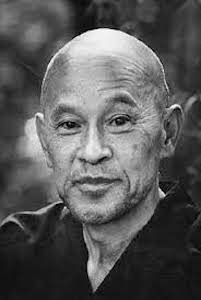
“Zen Mind, Beginner’s Mind” is best for those who are new to Zen meditation or wish to cultivate a beginner’s mind – a mind free from preconceptions and open to direct experience. Shunryu Suzuki emphasizes the importance of approaching meditation practice with a fresh and non-judgmental attitude, fostering a deeper understanding of oneself and the nature of reality.
Key Takeaways:
Memorable Quote:
“In the beginner’s mind, there are many possibilities, but in the expert’s, there are few.”
Shunryu Suzuki
Personal Reflection:
Reading “Zen Mind, Beginner’s Mind” by Shunryu Suzuki was a transformative experience for me. Suzuki’s profound teachings on approaching Zen practice with a beginner’s mind deeply resonated with me. The emphasis on non-attachment to preconceived notions and the openness to direct experience has had a profound impact on how I approach my meditation practice and daily life.
The book reminded me to let go of expectations and judgments, allowing me to cultivate a sense of curiosity and receptivity. Suzuki’s words continue to guide me in embracing the present moment with clarity and freshness, reminding me that true awakening lies in the simplicity of each breath.
Further Recommendation:
For practical insights on incorporating Zen principles into everyday life, Zen Habits is an exceptional resource. Run by Leo Babauta, this blog offers a wealth of articles, tips, and guidance for cultivating mindfulness, simplicity, and balance. Whether you’re seeking guidance on decluttering your physical space, establishing a meditation practice, or finding inner peace amidst the chaos of modern life, Zen Habits provides invaluable wisdom.
Get “Zen Mind, Beginner’s Mind” on
2. “The Miracle of Mindfulness” – Thich Nhat Hanh.
Best For Individuals seeking a practical and accessible Introduction to Mindfulness:
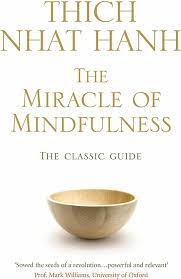
“The Miracle of Mindfulness” is best for individuals seeking a practical and accessible introduction to mindfulness. Thich Nhat Hanh’s teachings provide guidance for incorporating mindfulness into everyday activities, allowing readers to embrace the present moment and find joy in simple acts. With simplicity and clarity, Thich Nhat Hanh presents practical techniques and gentle guidance to cultivate mindfulness in our daily lives. Let’s explore the key elements of this influential book
Key Takeaways:
Memorable Quote:
“The miracle is not to walk on water. The miracle is to walk on the green Earth in the present moment, to appreciate the peace and beauty that are available now.”
Thich Nhat Hanh
Personal Reflection:
“The Miracle of Mindfulness” by Thich Nhat Hanh has been a gentle yet powerful companion on my mindfulness journey. Thich Nhat Hanh’s emphasis on cultivating awareness in every moment has helped me develop a deeper connection with myself and the world around me. The practice of mindful breathing and the art of conscious living have become integral parts of my daily routine.
The book’s teachings have taught me to appreciate the beauty and simplicity of ordinary moments, finding joy in the present rather than being lost in regrets of the past or worries about the future. Thich Nhat Hanh’s teachings have transformed the way I relate to myself and others, fostering a greater sense of compassion, peace, and gratitude in my life.
Get “The Miracle of Mindfulness” on
3. “The Heart of the Buddha’s Teaching” by Thich Nhat Hanh.
Best For understanding Buddhist Philosophy :
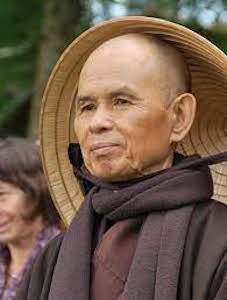
“The Heart of the Buddha’s Teaching” by Thich Nhat Hanh has been a profound guide on my journey to understanding the core teachings of Buddhism. Thich Nhat Hanh’s ability to distill complex concepts into accessible wisdom has deepened my understanding of the Four Noble Truths and the Eightfold Path. The book’s emphasis on mindfulness, compassion, and interbeing has shifted my perspective on suffering and helped me cultivate greater empathy for myself and others.
Thich Nhat Hanh’s teachings have become a guiding light, reminding me to approach life with kindness, awareness, and the intention to alleviate suffering. This book has been a precious gift on my spiritual path, offering timeless teachings that continue to inspire and transform my way of being.
Key Takeaways:
Memorable Quote:
“The present moment is the only moment available to us, and it is the door to all moments.”
Thich Nhat Hanh
Personal Reflection:
“The Heart of the Buddha’s Teaching” by Thich Nhat Hanh has been a profound guide on my journey to understand and embody the core teachings of Buddhism. Thich Nhat Hanh’s ability to distill complex concepts into accessible wisdom has deepened my understanding of the Four Noble Truths and the Eightfold Path. Through his teachings, I have come to recognize the interconnectedness of all beings and the transformative power of mindfulness in daily life.
One of the key takeaways that resonated with me was the invitation to cultivate mindfulness in all aspects of life. Thich Nhat Hanh’s teachings have inspired me to bring a mindful presence to ordinary activities, relationships, and challenges. By cultivating understanding and compassion, I have found a path to alleviate suffering, both within myself and in the world around me.
Further Recommendation:
Lions Roar is a comprehensive online platform that delves into various aspects of Buddhism, including Zen. Their blog features insightful articles, interviews, and reflections from esteemed Zen teachers and practitioners. It provides a space for deepening your understanding of Zen Buddhism and exploring its transformative teachings. Whether you’re a seasoned Zen practitioner or just starting your journey, Lions Roar offers a wealth of resources to support your exploration.
Get “The Heart of the Buddha’s Teaching” on
4. “The Three Pillars of Zen” – Philip Kapleau.
Best For Practicing Zen:
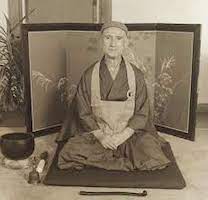
“The Three Pillars of Zen” by Philip Kapleau is a seminal work that offers both practical guidance and profound insights into Zen meditation and practice. Drawing from his own experiences and interviews with Zen masters, Kapleau presents a comprehensive exploration of Zen Buddhism. Kapleau skillfully weaves together instruction, personal anecdotes, and teachings from Zen masters, making this book valuable for beginners and experienced practitioners alike.
Key Takeaways:
Memorable Quote:
“Zen is not some fancy, special art of living. Our teaching is just to live, always in reality, in its exact sense.”
Philip Kapleau
Personal Reflection:
“The Three Pillars of Zen” has not only deepened my understanding of Zen principles but has also had a profound impact on my daily life. The integration of Zen into everyday activities, fostering mindfulness and compassionate action, has transformed the way I approach challenges and interact with others.
Through zazen, the practice of seated meditation, I have discovered a powerful tool for cultivating mindfulness, concentration, and self-awareness. The instructions provided in the book have helped me establish a consistent meditation practice, allowing me to experience moments of deep stillness and insight.
Get “The Three Pillars of Zen” on
5. “The Way of Zen” – Alan Watts.
Best For philosophical and historical Aspects of Zen.

“The Way of Zen” is best suited for those interested in delving into the philosophical and historical aspects of Zen. Watts offers a comprehensive overview of Zen Buddhism, making this book valuable for individuals seeking a deeper understanding of its origins, practices, and philosophy. Additionaly he skillfully presents the essence of Zen teachings, emphasizing the direct experience of reality and the importance of living in the present moment.
Key Takeaways:
Memorable Quote:
“The only way to make sense out of change is to plunge into it, move with it, and join the dance.”
Alan Watts
Personal Reflection:
“The Way of Zen” by Alan Watts has been a captivating exploration of Zen philosophy and its intersection with Eastern and Western thought. Watts’ ability to convey profound concepts in a relatable and accessible manner has expanded my understanding of Zen as a way of life. The book’s exploration of non-dualistic thinking and the concept of emptiness has challenged my conditioned ways of perceiving reality.
Watts’ words have invited me to embrace the paradoxical nature of existence, pointing to the interconnectedness of all things. “The Way of Zen” has encouraged me to cultivate a sense of wonder and curiosity, reminding me that the essence of Zen lies in the direct experience of this present moment.
Get “The Way of Zen” on
6. “The Rinzai Zen Way” – Meido Moore.
Best For exploring Rinzai Zen:
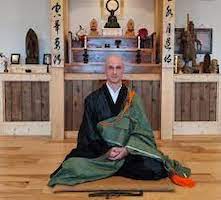
“The Rinzai Zen Way” by Meido Moore is a comprehensive guide to the Rinzai Zen tradition, offering practical instructions, insights, and historical context. Moore, a seasoned Zen teacher, provides a detailed exploration of Rinzai Zen practices and the transformative potential they hold. Moore’s expertise and meticulous approach make this book valuable for individuals seeking an in-depth understanding of Rinzai Zen practices, including koan study, zazen (seated meditation), and the role of the teacher-student relationship.
Key Takeaways:
Memorable Quote:
“Zen training is not about becoming something other than we are, but rather discovering and embodying what we truly are.”
Meido Moore
Personal Reflection:
“The Rinzai Zen Way” by Meido Moore has been a profound exploration of the Rinzai Zen tradition and its transformative power. Moore’s teachings on koan study and the role of the teacher-student relationship have deeply resonated with me. The book’s emphasis on rigorous practice, deep inquiry, and the cultivation of stillness of mind has challenged me to go beyond intellectual understanding and to immerse myself in the direct experience of Zen.
Moore’s insights have reminded me of the importance of surrendering to the guidance of a teacher and the value of humility and trust on the path. “The Rinzai Zen Way” has been a guiding light, encouraging me to embrace the challenges and rewards of this transformative practice.
Get “The Rinzai Zen Way” on
7. “Practical Zen: Meditation and Beyond” – Julian Daizan Skinner and Shinzan Miyamae.
Best Application for everyday Life:
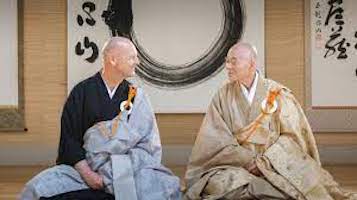
“Practical Zen: Meditation and Beyond” by Julian Daizan Skinner and Shinzan Miyamae offers a practical and accessible approach to Zen meditation and its application in everyday life. The authors provide clear guidance on various meditation techniques, exploring the potential for personal growth and transformation through Zen practice.
Key Takeaways:
Memorable Quote:
“Zen practice is not about escaping from life, but about diving deeply into it, meeting each moment fully, and awakening to the truth of our own being.”
Julian Daizan Skinner and Shinzan Miyamae
Personal Reflection:
“Practical Zen: Meditation and Beyond” by Julian Daizan Skinner and Shinzan Miyamae has been a practical and illuminating guide on my Zen journey. The book’s emphasis on various meditation techniques and their application in daily life has provided me with a versatile toolbox for cultivating mindfulness and presence. Skinner and Miyamae’s teachings have encouraged me to infuse Zen principles into all aspects of my life, from daily activities to relationships.
The practical tips and suggestions have empowered me to integrate Zen into my everyday experiences, fostering a deeper sense of connection, clarity, and peace. “Practical Zen” has been an invaluable resource, supporting me in embodying the transformative power of Zen in a practical and accessible way.
Get “Practical Zen: Meditation and Beyond” on
The Transformative Power of Zen: Why Start Your Journey Here?
Zen meditation, also known as Zazen, is a form of meditation rooted in the Zen Buddhist tradition. In this chapter, we will explore the essence of Zen meditation and delve into the reasons why one should consider embarking on this transformative practice.
The Essence of Zen Meditation.
Zen meditation is a practice of sitting in stillness and silence, cultivating a deep state of presence and awareness. It goes beyond mere relaxation or stress reduction and aims to awaken our innate wisdom and insight. Unlike other forms of meditation that focus on concentration or visualization, Zen meditation emphasizes non-striving, non-attachment, and the direct experience of reality as it is.
The Power of Silent Sitting.
At the heart of Zen meditation is the act of sitting in silence, observing the breath and the fluctuations of the mind without judgment. By becoming intimately aware of our thoughts, emotions, and bodily sensations, we develop a greater understanding of the impermanent and ever-changing nature of existence. Through this practice, we cultivate mindfulness, presence, and a deep sense of acceptance.
The Path to Self-Discovery.
Zen meditation is not merely a relaxation technique but a path of self-discovery and awakening. As we sit in stillness, we confront our inner landscape, including the habitual patterns of the mind and the illusions we cling to. By embracing this process with openness and curiosity, we gradually uncover the truth of our being and the interconnectedness of all things.
Cultivating Clarity and Compassion.
Zen meditation fosters clarity of mind, allowing us to see through the illusions of separation and ego. With a clear and compassionate mind, we develop a deeper sense of empathy, understanding, and interconnectedness with others. This leads to a natural inclination to act in ways that benefit not only ourselves but also the world around us.
Transforming Daily Life.
The benefits of Zen meditation extend beyond the meditation cushion, permeating into our daily lives. As we cultivate mindfulness and presence through regular practice, we become more attuned to the richness of each moment. We approach our tasks with renewed focus and purpose, engage in relationships with greater authenticity, and navigate challenges with resilience and equanimity.
In conclusion Zen meditation is a profound practice that invites us to explore the depths of our being and awaken to the present moment. By engaging in silent sitting, we cultivate mindfulness, clarity, and compassion, leading to personal transformation and a deeper understanding of ourselves and the world around us. Whether you are seeking inner peace, self-discovery, or a way to navigate the complexities of life, Zen meditation offers a path worth embarking upon.
Further Recommendation:
If you’re looking for a comprehensive guide on how to practice Zen meditation, look no further than LotusCrafts’ insightful blog post. Their in-depth article provides step-by-step instructions, practical tips, and guidance on cultivating a Zen meditation practice. From finding the right posture to focusing on the breath and navigating common challenges, LotusCrafts offers valuable insights to help you establish and deepen your meditation practice.
Wrap Up.
In this blog post, we embarked on a journey through the world of Zen meditation and explored seven remarkable books that can deepen our understanding and practice. Let’s recap the highlights and key takeaways from our exploration.
Throughout our exploration, we discovered that Zen meditation offers a profound path of self-discovery, awakening, and transformation. By sitting in silence, cultivating mindfulness, and embracing the present moment, we develop clarity of mind, compassion for ourselves and others, and a deeper connection to the world around us.
Zen meditation is not limited to the meditation cushion but extends into every aspect of our lives, guiding us to navigate challenges, cultivate authenticity, and live with purpose and resilience.
So, whether you are new to Zen meditation or seeking to deepen your practice, these seven books provide valuable insights, practical guidance, and inspiration for your journey.
May the wisdom and teachings shared in these books accompany you on your path of self-discovery, mindfulness, and awakening.
Further Recommendation:
If you’re hungry for some philosophical wisdom and eager to delve into the all-time greatest philosophy books, I highly recommend checking out my blog post dedicated to that very topic. In that article, I have curated a collection of the most influential and profound works in the history of philosophy. From Lao Tzu’s “Tao Te Ching” to Nietzsche’s “Thus Spoke Zarathustra” and beyond, these timeless classics have shaped the course of philosophical discourse. So, if you’re ready to continue on this journey, be sure to explore my recommended list of the all-time greatest philosophy books.
Last Updated on May 30, 2023 by Karl
Discloser:
Please note that some of the links below may contain affiliate links, which means that I may receive a commission if you decide to purchase a paid plan. However, this will not cost you anything extra, and I have included this information in our privacy policy. Please note that this site is not intended to provide financial advice and is solely for entertainment purposes.
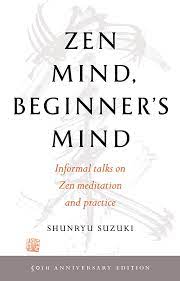
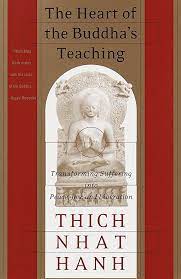
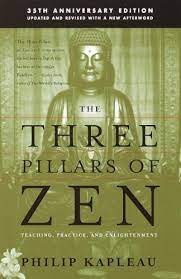
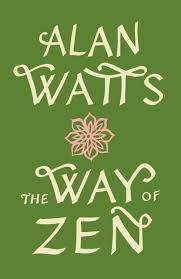
One Comment